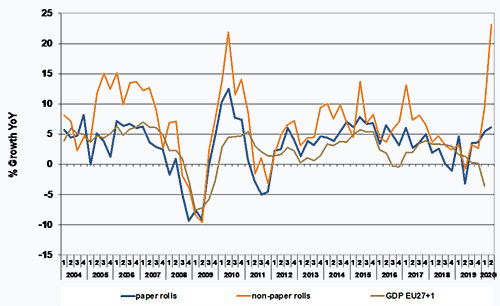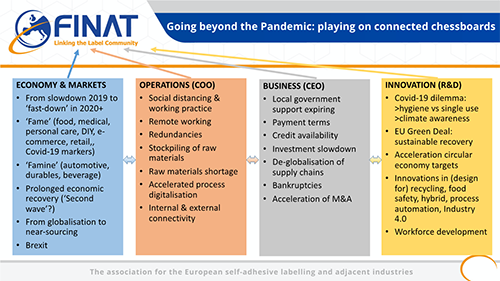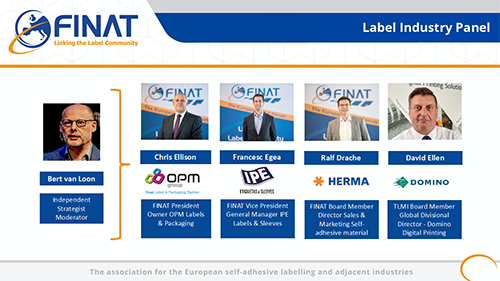FINAT briefings 16 and 21 July reflect on pandemic outcomes - European self-adhesive label industry passes Covid-19 stress test
After two years of modest, 1.5% annual demand growth in 2018 and 2019, the Covid-19 pandemic has boosted European demand for self-adhesive label materials in the first half of 2020. Consumption of labelstock materials in the wider European economic area was more than 8% above the level recorded in the same period last year. In the second quarter alone, demand for filmic roll label materials even exceeded the second quarter of 2019 by almost 25%.
The incremental demand increase for label materials in the first half of 2020 was almost 320 million m2. More than half of this (53%) was composed by filmic label materials. In relative terms, the most severely affected regions UK and Ireland and Southern Europe were behind the other (double digit) regions but still recorded sizeable increases.

‘A Tale of Fame and Famine’
The excessive overall demand growth in the first month (most likely reaching its peak in the first three months of the Pandemic, with the European economy in lockdown) was attributed to the crucial role of self-adhesive labels as enablers of the critical infrastructure in times of crisis: food, healthcare, personal care, sanitary products and supply chain logistics. This effect was compounded by stockpiling at retailers and brand owners, and the fact that households in lockdown decided to spend their spare time on home maintenance and home delivery of goods and services. Finally, with lockdown measures being released, it can hardly go unnoticed that self-adhesive products play an important part as ‘social distancing’ markers.
On the other hand, label demand in ‘non-essential’ sectors like automotive, electronics, travel and catering were suffering in the first half of 2020. The first two sectors also happened to be the two sectors recording negative growth rates in 2019 compared to the year before, according to preliminary results from the 13th edition of FINAT’s six-monthly Radar report to be released this July, the first time that two sectors reported a contraction since the monitor started in 2014. As FINAT President Chris Ellison commented: “Up till now, 2020 has been a tale of fame and famine for the industry. Certain parts of the industry could hardly cope with the excessive demand pressures, others had to rapidly adjust to a steep drop in demand in their sector.”
The fact that so far in 2020, short term economic survival prevailed over longer term investment was not only apparent in consumer goods and services, but also in the label industry’s investment projections. According to the same Radar report, label converter companies have tended to delay investment in heavy equipment till at least 2021, a year that will be heavily packed with trade shows including three Labelexpo shows in different regions. Another tale of fame and famine are the tensions at operational level in the production facilities that on the one hand had to cope with excessive demand for label solutions and delayed payments from customers, while at the same time coping with disruptions in raw materials supply and shortage of staff due to Covid-19 restrictions and worker health issues.
Industry dashboard of parameters
Since the outbreak of the Pandemic at the beginning of March, FINAT, the European label association representing some 600 member facilities overall, has been liaising with its members online via regular Covid-19 briefings, zoom meetings and most recently FINAT briefings, to update members on the latest status of the local and European lockdown measures, report on actions undertaken by national and European label and packaging industry bodies, but also to provide the platform for members to stay connected, exchange experiences and provide mutual support in handling the crisis together.
Based on the various online conversations, the association has compiled an industry dashboard summarising the multidimensional parameters to be addressed in these disruptive times.

Passing the stress test
During the latest FINAT Briefing held on 21 July, by way of ‘summer reflection’, the association hosted a panel of industry leaders to take stock of the experiences from the past 4 months, and provide an outlook into the second half of the year and the period beyond the pandemic. Guided by FINAT’s ‘moderator in residence’ Bert van Loon, the four panellists, FINAT President Chris Ellison (OPM Labels and Packaging, UK), Vice President Francesc Egea (IPE Labels and Sleeves, Spain), FINAT Board member Ralf Drache (Herma, Germany) and TLMI Board member David Ellen (Domino Digital Printing, US) expressed their interpretation of the data and reflected on the outlook for the ‘C-suite’ agenda for the coming period.
Ralf Drache commented: ‘Our industry has passed the stress test. In the overheated essential markets of the past few months, label companies have demonstrated their flexibility, resilience and agility. Our industry’s innate ability to respond rapidly to the disruptive circumstances has confirmed its role as a reliable partner, and this will open up new opportunities for more open, collaborative relationships along the supply chain’.
Francesc Egea confirmed that every crisis also brings opportunities, but warned that ‘The surname of this crisis is ‘Fear’. We therefore have to analyse where the opportunities are and manage them against the risk. These are not so much in the embellishments as they are in innovative functionality. Innovation can also relate to the service we are providing, or the way we are organised. The future demands that as an organisation we are more flexible in our engagement with customers as well as our supply chain in terms of planning and forecasting. This crisis has confirmed the importance of solidarity in solving things together and has demonstrated the power of associations as a source of networking.’
David Ellen added: ‘Innovation is the lifeblood of this industry. As terrible as this pandemic has been, it is also driving further innovation and change. Firstly, the tracking and tracing of contamination of people during the healthcare crisis will create an immense push for tracking and tracing at product level, not only for food safety but also for medical drugs. It will further accelerate the trend towards greater flexibility, shorter run lengths and rapid changeability. And like we see now with this virtual ‘town hall’ meeting, the crisis will also radically change the way we interact with our customers, for instance with online demos.’
FINAT President Chris Ellison concluded: ‘Perhaps the change will not be as drastic as we now assume. Our KPIs as a business will remain the same and we still need to balance opportunity with risk, and the short term with the longer term. Where I do foresee a huge change is in the culture, the people side of our business. First of all, it now all starts with the health and safety of our people. If we are talking about a ‘reset’ of our industry, it should be about embedding the change culture in the way we educate our own people, our customers and suppliers. In the end, the success of businesses depends to a large degree on the way we interact internally and externally. If this crisis has taught us anything, it is about the mutuality of our shared interests.’

FINAT members can download the slide-deck of the label industry market trends presentation from 16 July, as well as the FINAT Radar report to be released in week 31. On the members-only section of the FINAT website, they can also view the recordings of the FINAT Briefings from 16 and 21 July as well as those of previous briefings. The FINAT Webinar Series continues on 8 September. For more information see https://www.finat.com/events/finat-webinars






